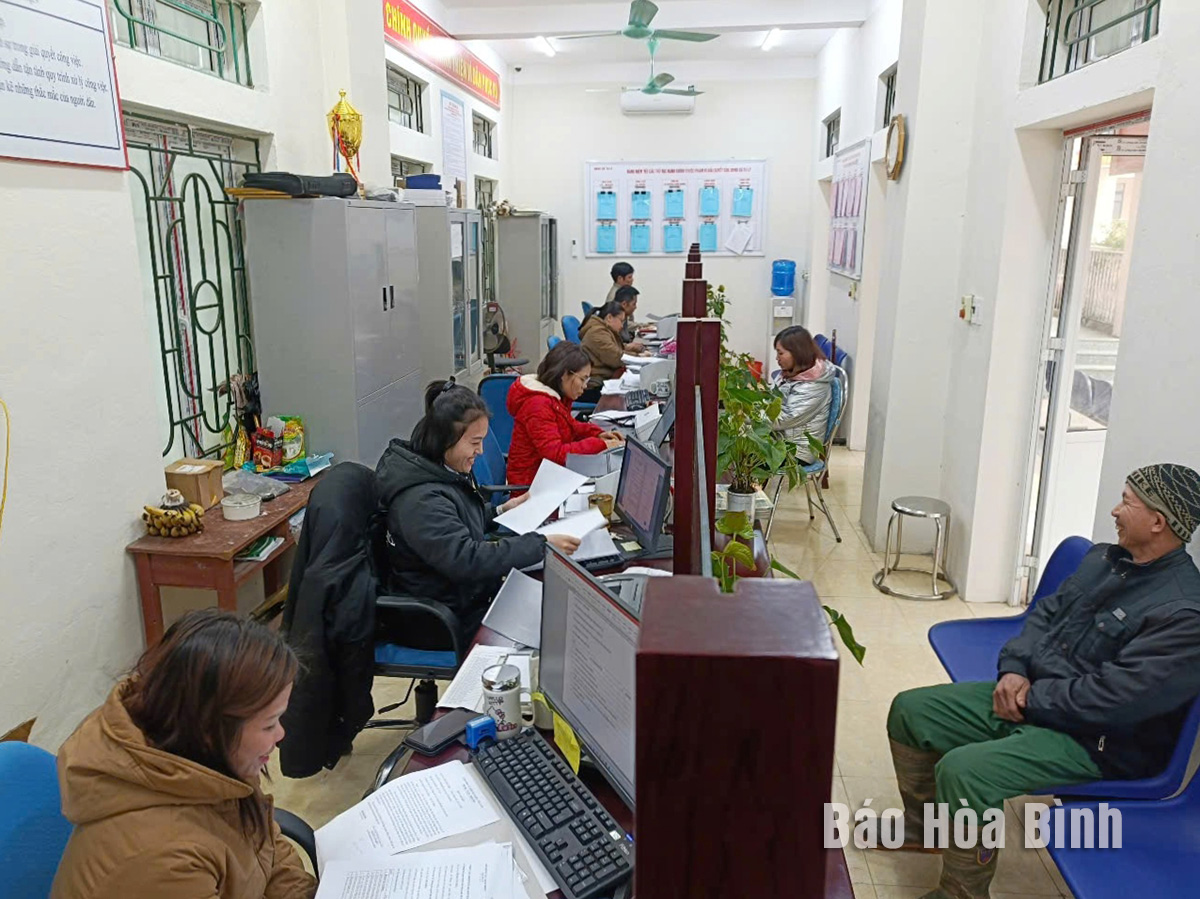
In recent years, Da Bac district has improved administrative reform with a one-stop shop mechanism, streamlined inter-agency procedures, and a shift to digital platforms. These efforts have enhanced public service efficiency and contributed to local socio-economic development.
The Reception and Result Delivery Division of the Tu Ly commune People’s
Committee facilitates administrative procedures for residents.
According to Luong Van Thi, Chairman of Da Bac district People’s Committee, in
2024, the district worked to ensure transparency at both the district and
commune levels. Over the year, 18,751 administrative procedure applications
were received, including 811 at the district level and 17,940 at the commune
level, with 99.8% processed on time or ahead of schedule.
The rollout of online public services has also seen positive outcomes. Pilot
initiatives, such as "Paper-Free Day” and "Same-Day Processing”, introduced in
Tu Ly and Cao Son communes, handled 179 cases efficiently. Digitiation efforts
have progressed, with 71% of documents now digitised, reducing bureaucracy and
saving residents’ time. A public satisfaction survey recorded a 100% approval
rating from citizens and businesses regarding administrative services.
Ban Van Hanh from Bai hamlet, Cao Son commune, said administrative procedures
used to be time-consuming, requiring multiple visits. However, thanks to reform
efforts and proactive guidance from officials, procedures can now conveniently
be completed in a single visit.
Despite progress, challenges remain. The adoption of online applications are
among the obstacles, particularly in remote areas, where digital literacy is
still limited. Additionally, inter-agency coordination in processing
applications is not yet seamless, causing delays. The update and publication of
new administrative procedures should be more concerted.
To address these issues, the district plans to restructure internal
administrative procedures across sectors, modernising administrative services
for citizens and businesses, and implementing electronic reporting to transition
towards real-time automated reporting. The district will strictly enforce the
use of digital signatures and ensure all procedures are processed fully online,
eliminating reliance on paper-based workflows.
With a comprehensive approach and strong commitment, Da Bac district seeks to
create breakthroughs in administrative reform, improve public satisfaction, and
promote sustainable socio-economic growth.
The Standing Board of the Hoa Binh provincial Party Committee has agreed in principle on a proposal by the Standing Board of the Party Committee of Hoa Binh city to gather feedback on the city’s 1:2000 zoning plan, which forms part of its broader urban development strategy.
Hoa Binh province has made notable progress in public administration reform and digital government development, with the satisfaction index among citizens and businesses reaching over 84%, according to recent government evaluations.
Thanks to great efforts by local authorities in recent times, the governance and public administration performance of Mai Chau district has been significantly improved.
In the afternoon of June 6, the Party Committee, the People's Council, the People's Committee and the Fatherland Front of Lac Son district solemnly held a meeting to celebrate the 139th anniversary of the district's founding (1886–2025) and the 79th anniversary of the establishment of the district's Party Committee (1946–2025). There was the attendance of Mr. Bui Van Thang, the Vice Chairman of the Provincial People's Council; Mr. Quach Tat Liem, the Vice Chairman of the Provincial People's Committee; Ms. Dang Bich Ngoc, the Deputy Head of the National Assembly Delegation of the province; as well as the former leaders of the province and district through various periods, who are the natives of the district.
Implementing the Politburo’s Resolution No. 57-NQ/TW on breakthroughs in science – technology, innovation, and digital transformation is a golden opportunity for the northern mountainous province of Hoa Binh to renew growth model, improve competitive edge and shorten digital gap.
Resolution 57-NQ/TW, issued by the Politburo on December 22, 2024, identifies sci-tech, innovation, and digital transformation as strategic breakthroughs to build a developed and prosperous nation. In Hoa Binh province, this spirit is not just a slogan, it’s being put into action through concrete initiatives that form a "new development triangle”: digital citizenship, digital economy, and digital administration.



